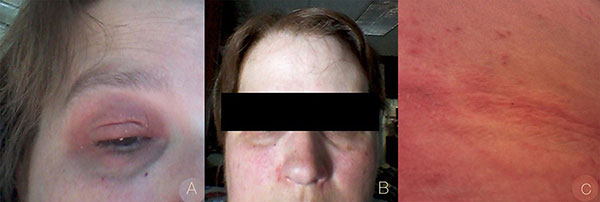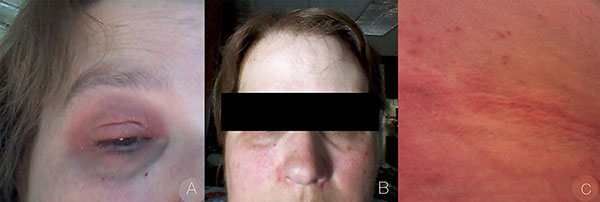Session Information
Date: Tuesday, November 12, 2019
Title: Miscellanous Rheumatic & Inflammatory Disease Poster III: Autoimmune Conditions and Therapies
Session Type: Poster Session (Tuesday)
Session Time: 9:00AM-11:00AM
Background/Purpose: Yao syndrome (YAOS, OMIM 617321), formerly termed nucleotide-binding, oligomerization domain 2(NOD2)-associated autoinflammatory disease, has become increasingly recognized. The disease has been reported in America, Europe and Asia, and seems not uncommon. This study aimed to report novel phenotypic and genotypic findings in the disease.
Methods: This is a retrospective review of electronic medical records (EMRs) of 11 patients with YAOS, and the study was approved by the Stony Brook University (SBU) Institutional Research Board. These patients after an extensive workup without a unified diagnosis were referred to our Center of Autoinflammatory Disease at SBU, and followed up, and the charts were well documented by the lead author who has a vested interest in the disease. All these patients underwent genetic testing for periodic fever syndrome 6-gene panel (MEFV, TNFRSF1A, NLRP3, MVK, NLRP12 and NOD2) or targeted gene sequencing for NOD2. These patients were included in the study because they fulfilled the diagnostic criteria for YAOS and had either eyelid swelling as corroborated by i-phone photographs and/or NOD2 variants that were not identified previously for the disease. Continuous variables were expressed as median, interquartile range, and frequency for descriptive statistics.
Results: All YAOS patients (10 females, 1 male) were Caucasians with the mean age of 25.9 at disease onset. They shared such known common phenotype for YAOS as fever, rash, arthritis/arthralgia, gastrointestinal, and sicca-like symptoms (Table 1). Three patients had a family history of the similar symptoms. Of note, 7 of the 11 patients developed unilateral or bilateral eyelid swelling with or without discoloration or eye redness (Figure 1). The symptom recurred and concurred with other clinical manifestations during disease flares and each episode lasted several hours to a few days with resolution. Six of the 7 patients carry the common NOD2 variants associated with YAOS. Of the 11 patients, 5 patients had clinical characteristics of YAOS and carry the rare NOD2 variants. These data support eyelid swelling as a new clinical feature of YAOS, and the spectrum of NOD2 variants associated with YAOS is extended.
Conclusion: This study indicates that the eyelid swelling and rare NOD2 variants are added clinical and genetic characteristics of YAOS. Recognition of the expanded disease spectrum will foster prompt diagnosis and management of the disease.
To cite this abstract in AMA style:
Yao Q, Kontzias A. Expanding the Phenotypic and Genotypic Spectrum in Yao Syndrome [abstract]. Arthritis Rheumatol. 2019; 71 (suppl 10). https://acrabstracts.org/abstract/expanding-the-phenotypic-and-genotypic-spectrum-in-yao-syndrome/. Accessed .« Back to 2019 ACR/ARP Annual Meeting
ACR Meeting Abstracts - https://acrabstracts.org/abstract/expanding-the-phenotypic-and-genotypic-spectrum-in-yao-syndrome/


